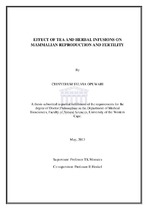Effect of tea and herbal infusions on mammalian reproduction and fertility
Abstract
Camellia sinensis (tea) and Aspalathus linearis (rooibos) may improve reproductive function owing to their antioxidant properties. To test this
hypothesis, male and female rats were given 2% and 5% green tea (Gt), black tea (Bt), unfermented rooibos (Ur) or fermented rooibos (Fr) as sole source of drinking for 52 and 21 days respectively. Control rats received tap water. In addition, TM3 Leydig cells were exposed to 0.025, 0.05, 0.1 and 0.5 % aqueous extracts of green tea, black tea, unfermented and fermented rooibos for 24h. In vitro analysis of tea and the herbal infusion revealed the phenolic property and antioxidant capacity (FRAP) in the order Gt > Bt > Ur > Fr. Camellia sinensis and Aspalathus linearis revealed no significant effect on serum antioxidant capacity (p > 0.05) and lipid peroxidation (MDA) in the kidney or liver in both male and female rats and in the testes of the male rats (p > 0.05). In addition, the antioxidant levels were maintained in the testes, liver and kidneys in both the male and female rats. In the male rats, no significant alterations were observed in body weight gain, liver and reproductive organs weight, and serum testosterone (p > 0.05). Only, 5% green tea significantly increased testosterone level (p < 0.05). Seminiferous tubules displayed complete spermatogenesis with abundant sperm in the lumen in all treated groups. However, a significant decrease in diameter and germinal epithelial height of these tubules were observed (p < 0.05). In the epididymides, epithelial height of caput region showed a significant increase (p < 0.01), while the cauda region was increased by Camellia sinensis but decreased by Aspalathus linearis. Sperm concentration improved significantly by green tea and unfermented rooibos (p < 0.05), while black tea and fermented rooibos produced a non significant effect (p > 0.05). Sperm viability was enhanced in all treatment groups (p < 0.05). Furthermore, green tea, black tea and unfermented rooibos significantly improved the motility of rat sperm (p < 0.05); fermented rooibos tended to improve it (p > 0.05). In addition, green tea, black tea and fermented rooibos enhanced acrosome reaction (p < 0.05). Creatinine activity was significantly higher in rats treated with black tea, unfermented rooibos or fermented rooibos (p < 0.05), green tea tended to increase it (p > 0.05) reflecting the significant increased kidney weight in the treatment groups at high concentrations. Liver markers, ALT and AST, decreased significantly in all treated groups (p < 0.05), except in 5% fermented rooibos where a significant increase in AST level was observed (p < 0.01). In the female rats, the body weight gain, and reproductive organs weight was no affected (p > 0.05). However, 5% fermented rooibos reduced the ovarian weight (p < 0.05), while 5% unfermented rooibos significantly increased the uterine weight (p < 0.05). Liver weight increased significantly by black tea and unfermented rooibos (p < 0.05) while the kidney weight increased significantly by 5% black tea (p < 0.05). No significant effect was observed in the level of FSH produced, on the other hand, Camellia sinensis significantly lowered the level of LH (p < 0.05), while Aspalathus linearis had no effect (p > 0.05). Creatinine activity was enhanced significantly only by 5% fermented rooibos (p < 0.05). Liver markers, ALT and AST were reduced in most treated groups except in fermented rooibos where an increase was observed. In addition, histological sections revealed no obvious alteration in the ovaries, uteri, kidneys and liver of all treated female rats. Camellia sinensis and Aspalathus linearis significantly reduced the level of testosterone produced in TM3 Leydig cells under stimulated conditions in vitro (p< 0.05). Furthermore, both plants maintained the viability and morphology of the cells. However, at 0.5% of either plant extracts, a significant decrease in the viability (p < 0.05) and altered morphology of the TM3 Leydig cells was observed. In conclusion, Camellia sinensis and Aspalathus linearis significantly improved certain sperm function which might be attributed to their high level of antioxidant activity. However, the prolonged exposure of both plant extracts might result in subtle structural changes in the male reproductive system and impair kidney function. In addition, fermented rooibos at high concentration may also impair the functions of the liver. In vitro, both plants were shown to possess anti-androgenic property on TM3 Leydig cells. Furthermore, both Camellia sinensis and Aspalathus linearis may be classified as weak phytoestrogens due to the changes in the weight of the uterus and ovaries observed.

